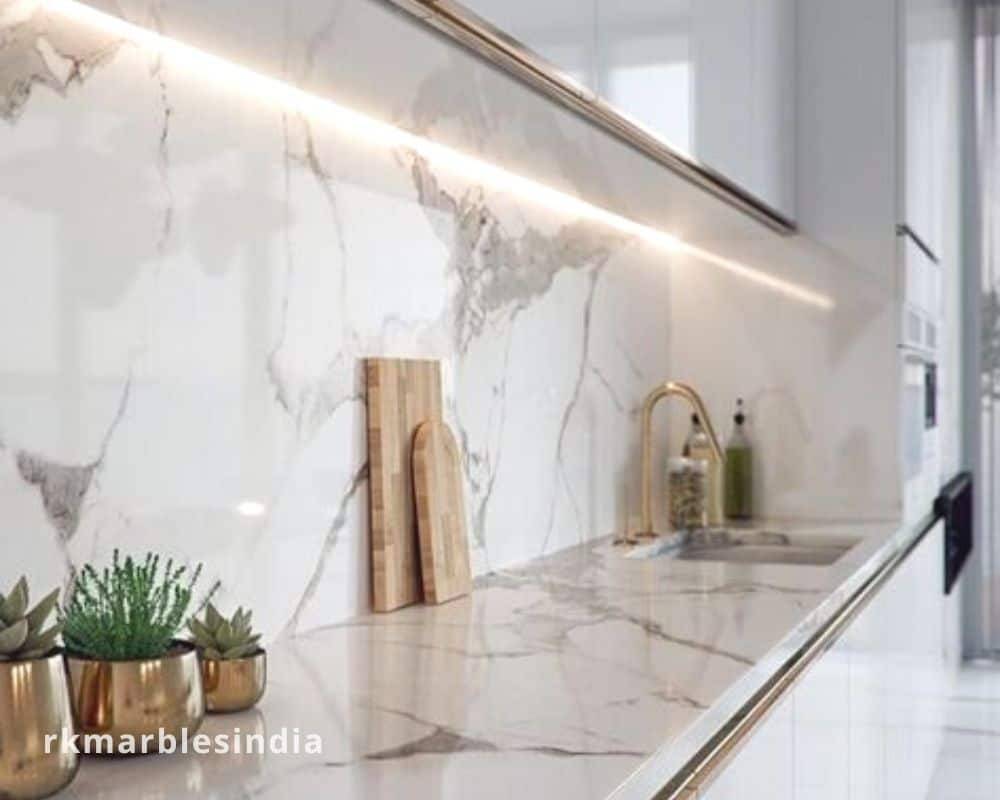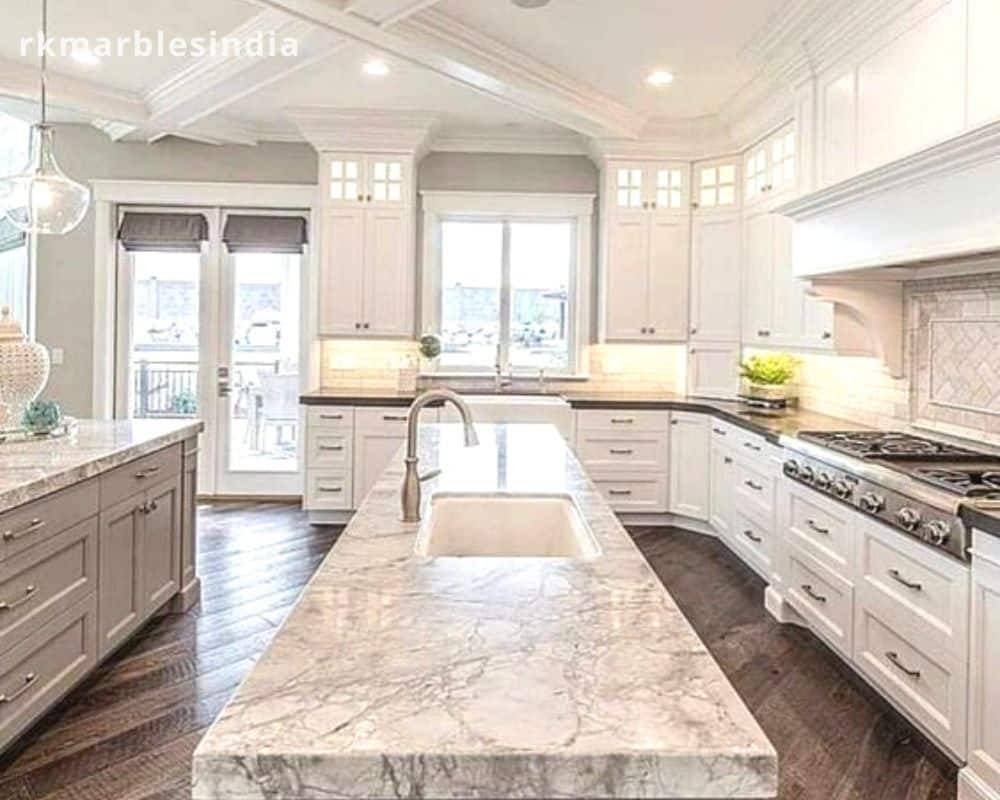Table of Contents
Frequently Asked Questions About Marble Countertops
Welcome to our comprehensive FAQ guide on the timeless and elegant world of marble countertops! Are you currently considering a kitchen renovation or simply looking to add a touch of luxury? Marble countertops have long been revered for their unparalleled beauty, but before leaping, it’s essential to explore all aspects. From durability and maintenance concerns to design versatility and cost-effectiveness, we’ve got you covered with answers to your most burning questions. So grab a cup of coffee, sit back, and let’s dive right in as we unravel whether marble countertops are truly the perfect fit for your kitchen!

Pros and Cons of Choosing Marble for Your Kitchen
Marble countertops have been a popular choice for kitchen renovations for many years, and it’s not hard to see why. The elegant and timeless look of marble can elevate the overall aesthetic of any kitchen, making it a desirable option for homeowners. However, like any other material, marble also has its own set of pros and cons.

Pros:
1. Aesthetics:
As mentioned earlier, one of the main reasons people choose marble is due to its stunning visual appeal. Its natural veining patterns make every slab unique and add character to any kitchen design.
2. Heat Resistance:
Marble is a great heat conductor, meaning it can withstand high temperatures without sustaining damage or discolouration. This makes it an ideal choice for baking enthusiasts who need a cool surface for working with dough.
3. Durability:
When properly sealed and maintained, marble can last for many years without showing signs of wear and tear. It is also resistant to scratches and chips, making it suitable for high-traffic areas such as the kitchen.
4. Value:
Marble is considered a luxury material in the world of home renovation, making it highly sought after by potential buyers if you ever decide to sell your house. Installing marble countertops can increase the value of your property significantly.
Cons:
1. Porous Nature:
One major drawback of using marble in the kitchen is its porous nature. This means that liquids such as wine or vinegar can seep into the stone if left unattended for too long, causing stains that may be difficult to remove.
2. High Maintenance:
Despite being durable when sealed properly, marble requires regular maintenance to keep its shine intact. It needs to be resealed every 6-12 months (depending on usage) to prevent staining and damage from acidic substances.
3. Susceptible to Scratches:
While relatively scratch-resistant compared to other materials like quartz or granite, marble is still prone to scratching if sharp objects are dragged across its surface. It is best to use cutting boards and avoid using abrasive cleaning products.
4. Cost:
Marble countertops can be expensive, depending on the type and quality of the stone. This may not be a feasible option for those on a tight budget. The Price of marble is expensive compared to other natural stones.

Are Marble Countertops Right for Your Kitchen? A Comprehensive FAQ Guide

Q: What is marble?
A: Marble is a type of natural stone that is formed from limestone under intense pressure and heat. It is composed mainly of calcite or dolomite minerals and has distinct veining patterns.
Q: Are marble countertops durable?
A: Yes, marble countertops are known for their durability and can last for decades if properly maintained. They are resistant to scratches, chips, and cracks although they may be prone to etching from acidic substances.
Q: How do I clean and maintain my marble countertops?
A: To keep your marble countertops looking their best, it is recommended to clean them with mild soap and water using a soft cloth or sponge. Avoid using harsh cleaners or abrasive materials as they can damage the surface of the marble. Additionally, sealing your marble countertop every 6-12 months can help protect against stains.
Q: Is it true that marble is porous?
A: Yes, like other natural stones, marble is porous which means it has tiny spaces between its particles where liquids can seep in. However, when properly sealed and maintained, the porosity of marble should not pose any major issues in terms of staining.
Q: Can I place hot pots or pans directly on my marble countertop?
A: While marble has excellent heat resistance properties compared to other countertop materials such as laminate or wood, it is still recommended to use trivets or hot pads when placing hot items on the surface to avoid any potential damage.
Q: Will my marble countertop have visible seams?
A: Since marble is a natural stone, each slab will have its unique veining pattern and colour variations. This means that visible seams may be present when multiple slabs are used for larger countertops. However, a skilled installer can minimize the appearance of these seams and create a cohesive look.
Q: How much do marble countertops cost?
A: The cost of marble countertops can vary depending on factors such as the type of marble, thickness, and installation costs. On average, expect to pay between Rs 250- Rs 1200 per square foot for professionally installed marble countertops.
Q: What is etching on marble?
A: A large portion of marble is calcium carbonate. When acidic substances come into contact with marble, they react and get eaten away. Etching is not merely a stain but is a physical change in the stone’s surface. It is more difficult to repair than a stain. Some consumers prefer honed marble for countertops because it appears like a dull spot on polished surfaces.
Q: What is the difference between polished marble and honed marble?
A: A polished marble is shiny and feels very smooth. Honed marble is less shiny and feels more like a matte finish. It still has a slight gloss, but it is less reflective than polished marble. For their homes, many people choose honed marble over polished marble because scratching or etching is less noticeable.
Q: Do marble countertops require a sealant?
A: Marble countertops do not necessarily require a sealant, but it is highly recommended as it helps protect the surface from stains and damage. Sealing the marble also enhances its natural beauty, making it more resistant to scratches and etching caused by everyday use. Additionally, the sealant can help protect against moisture and bacteria buildup, ensuring that your marble countertop stays clean and hygienic.
We hope this FAQ section has provided you with valuable information about marble countertops. Ultimately, the decision to install them in your kitchen should be based on your personal preferences and lifestyle needs. If you have any further questions or concerns, it is always best to consult with us or any professional before making a final decision.

We at R.K. Marbles India manufacture a wide range of marble for countertops, walls, and flooring at competitive prices.
To learn more about any other natural stone, please call +91-9928979999
You can also follow us on Facebook and Instagram
